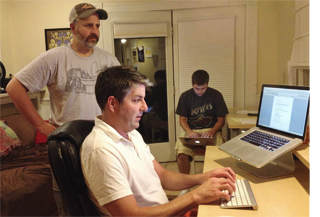4 Video Production Tips Learned During The Guerrilla Film Challenge
Storyboard Films recently participated in the 2013 Guerrilla Film Challenge. We were tasked with writing, shooting, and editing a 5-8 minute film in 48 hours. Trying to accomplish so much in such a short time period placed a lot of emphasis on smart project management and collaborative team play. Needless to say, we learned a lot from the experience and thought we would share. Here are 4 crucial video production tips we gleaned from the experience.
1. Clearly define team roles.
Before doing any kind of planning, we brainstormed all the different jobs that crew members would need to perform and assigned them to specific team roles. Our team consisted of a producer, writer/director, cinematographer, and editor. In the end, all of us helped with every task, but each person had final say in his or her area. This prevented arguments and helped deal with any differences in creative decision-making.
We quickly discovered that the most important role was the one we forgot. We never defined the role of sound operator. Sound is often one of the most important and overlooked things. Perhaps this is because when sound is good, no one notices it. The lack of accountability on this critical piece definitely created problems. We often found ourselves scrambling to set up audio equipment and have someone run it. Not only did this cause confusion and unnecessary effort but it pulled that person away from their primary role. The lack of continuity hurt us as well - the quality and signal level varied greatly from scene to scene.
2. Clearly define your process.
One of the advantages of planning is that you can do plenty of it before starting the competition. We focused on clearly defining our process up front. We listed out each step that we would need to take from start to finish. Once we knew what our steps, we targeted completion times for each. It helped us stay on track and prevented us from falling into the trap of being perfectionists.
3. Manage your project scope - don’t let it manage you!
We intentionally spent a lot of time on our story outline. A good story is key for all the obvious reasons. But equally important was coming up with a story that we could pull off. We were given the tricky task of creating an “EPIC” movie. The mere word “EPIC” can tempt you into trying to hatch a blockbuster film. What we ultimately decided was to take a seemingly mundane activity (a job interview) and turn it into an epic journey. The creative interpretation of epic helped make our project scope very manageable. Making it manageable allowed us to focus on bringing our story to life instead of worrying about how to visualize something that was too complex or grand.
4. Be open and consider new ideas throughout the project
Even after distinguishing roles, it became obvious that we needed to be open to everyone’s ideas. There were many cases in filming when one member was allowed to make a creative change or decision that inevitably was the best option.
There is a lot to be said for fluid development of any type of video project, especially when you have a time deadline. Your end product rarely turns out exactly how you envisioned or planned. You have to take what you can get, and know that everything will work out in the end. Once again, being a perfectionist is a trap.
Some major changes we had to make included locations, supporting actors, and even the conclusion to our story. In all three cases, the changes we made turned out to be a lot better than we originally planned and helped develop the film into a more complete story.
In the end, we all had a great time participating in the contest and learned a lot from the experience. It's amazing what you can do when you are given a crazy challenge and you agree up front that failure is not an option!




